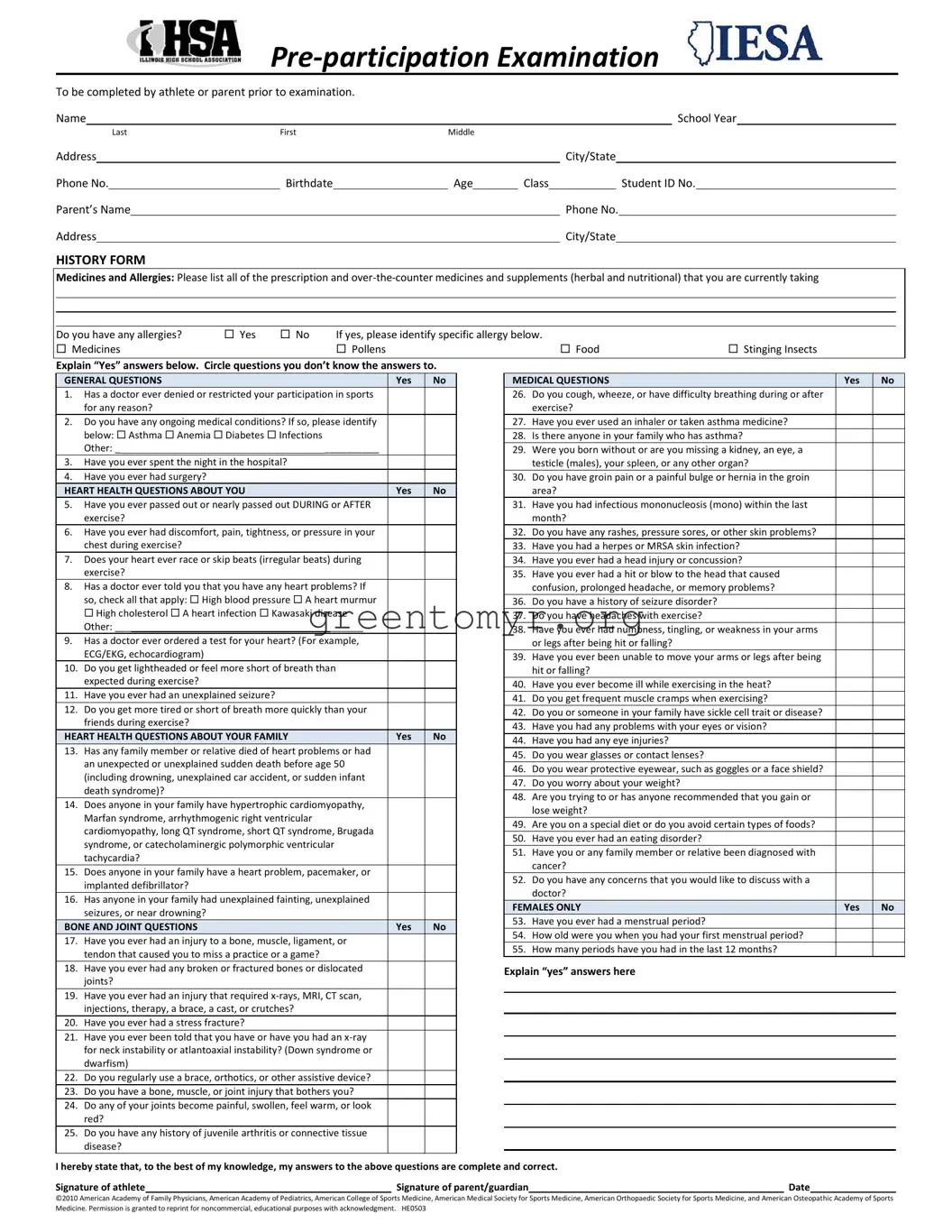|
|
|
|
|
|
|
|
|
|
|
GENERAL QUESTIONS |
|
|
|
Yes |
No |
1. |
Has a doctor ever denied or restricted your participation in sports |
|
|
|
|
for any reason? |
|
|
|
|
|
2. |
Do you have any ongoing medical conditions? If so, please identify |
|
|
|
|
below: Asthma Anemia Diabetes Infections |
|
|
|
|
|
|
|
Other: _ |
|
__________ |
|
|
|
|
|
|
|
|
|
|
|
3. |
Have you ever spent the night in the hospital? |
|
|
|
|
|
4. |
Have you ever had surgery? |
|
|
|
|
|
|
HEART HEALTH QUESTIONS ABOUT YOU |
|
|
|
Yes |
No |
5. |
Have you ever passed out or nearly passed out DURING or AFTER |
|
|
|
|
exercise? |
|
|
|
|
|
6. |
Have you ever had discomfort, pain, tightness, or pressure in your |
|
|
|
|
chest during exercise? |
|
|
|
|
|
7. |
Does your heart ever race or skip beats (irregular beats) during |
|
|
|
|
exercise? |
|
|
|
|
|
8. |
Has a doctor ever told you that you have any heart problems? If |
|
|
|
|
so, check all that apply: High blood pressure A heart murmur |
|
|
|
|
High cholesterol A heart infection Kawasaki disease |
|
|
|
|
Other: ___ |
|
|
______ |
|
|
|
|
|
|
|
9. |
Has a doctor ever ordered a test for your heart? (For example, |
|
|
|
|
ECG/EKG, echocardiogram) |
|
|
|
|
|
10. |
Do you get lightheaded or feel more short of breath than |
|
|
|
|
expected during exercise? |
|
|
|
|
|
11. |
Have you ever had an unexplained seizure? |
|
|
|
|
|
12. |
Do you get more tired or short of breath more quickly than your |
|
|
|
|
friends during exercise? |
|
|
|
|
|
|
HEART HEALTH QUESTIONS ABOUT YOUR FAMILY |
|
|
|
Yes |
No |
13. |
Has any family member or relative died of heart problems or had |
|
|
|
|
an unexpected or unexplained sudden death before age 50 |
|
|
|
|
(including drowning, unexplained car accident, or sudden infant |
|
|
|
|
death syndrome)? |
|
|
|
|
|
14. |
Does anyone in your family have hypertrophic cardiomyopathy, |
|
|
|
|
Marfan syndrome, arrhythmogenic right ventricular |
|
|
|
|
|
|
|
cardiomyopathy, long QT syndrome, short QT syndrome, Brugada |
|
|
|
|
syndrome, or catecholaminergic polymorphic ventricular |
|
|
|
|
tachycardia? |
|
|
|
|
|
15. |
Does anyone in your family have a heart problem, pacemaker, or |
|
|
|
|
implanted defibrillator? |
|
|
|
|
|
16. |
Has anyone in your family had unexplained fainting, unexplained |
|
|
|
|
seizures, or near drowning? |
|
|
|
|
|
|
BONE AND JOINT QUESTIONS |
|
|
|
Yes |
No |
17. |
Have you ever had an injury to a bone, muscle, ligament, or |
|
|
|
|
tendon that caused you to miss a practice or a game? |
|
|
|
|
|
18. |
Have you ever had any broken or fractured bones or dislocated |
|
|
|
|
joints? |
|
|
|
|
|
19. |
Have you ever had an injury that required x-rays, MRI, CT scan, |
|
|
|
|
injections, therapy, a brace, a cast, or crutches? |
|
|
|
|
|
20. |
Have you ever had a stress fracture? |
|
|
|
|
|
21. |
Have you ever been told that you have or have you had an x-ray |
|
|
|
|
for neck instability or atlantoaxial instability? (Down syndrome or |
|
|
|
|
dwarfism) |
|
|
|
|
|
22. |
Do you regularly use a brace, orthotics, or other assistive device? |
|
|
23. |
Do you have a bone, muscle, or joint injury that bothers you? |
|
|
24. |
Do any of your joints become painful, swollen, feel warm, or look |
|
|
|
|
red? |
|
|
|
|
|
25. |
Do you have any history of juvenile arthritis or connective tissue |
|
|
|
|
disease? |
|
|
|
|
|


